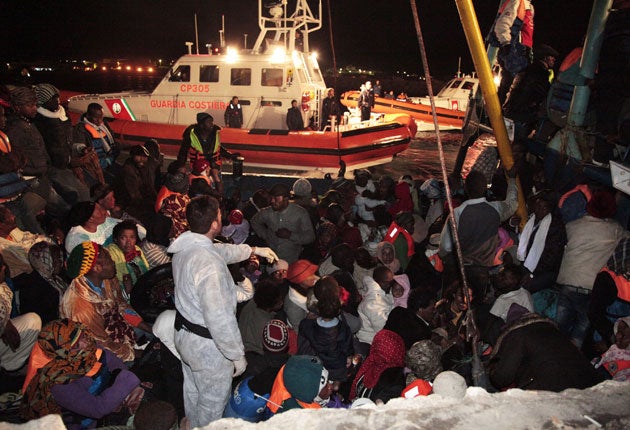Ship 'with 600 people aboard' sinks as refugees flee from Libya

Your support helps us to tell the story
From reproductive rights to climate change to Big Tech, The Independent is on the ground when the story is developing. Whether it's investigating the financials of Elon Musk's pro-Trump PAC or producing our latest documentary, 'The A Word', which shines a light on the American women fighting for reproductive rights, we know how important it is to parse out the facts from the messaging.
At such a critical moment in US history, we need reporters on the ground. Your donation allows us to keep sending journalists to speak to both sides of the story.
The Independent is trusted by Americans across the entire political spectrum. And unlike many other quality news outlets, we choose not to lock Americans out of our reporting and analysis with paywalls. We believe quality journalism should be available to everyone, paid for by those who can afford it.
Your support makes all the difference.A ship carrying up to 600 migrants has sunk off the coast of Libya, witnesses have reported, in what would be one of the worst accidents to have befallen refugees fleeing recent unrest in North Africa, if confirmed.
Accounts of the accident, at the end of last week, are only now beginning to emerge. At least 16 bodies, including those of two babies, were recovered from the stricken ship after they washed ashore, the United Nations Refugee Agency has said. It is feared hundreds more could be dead.
Thousands of refugees have attempted to escape fierce fighting in Libya and ongoing unrest in Tunisia for Europe in recent months, leading to overcrowding on boats that are often unsafe.
Witnesses on a second boat said the vessel broke up shortly after departing from a port near the Libyan capital, Tripoli, and gave accounts of bodies floating in the sea, according to the UN. Many of those on the second boat, which later landed in Italy, had relatives on the sinking ship and some said they refused to board after seeing the boat hit trouble, but were forced on to the second ship by Libyan soldiers.
The UN said it had no information regarding the nationality of those on the vessel, but said that many of those waiting in Italy were Somali. The agency added that it was unclear if anyone had mounted a rescue mission, but said that Nato was not involved in any search.
The refugee ship is one of dozens that have attempted the journey to Europe since the uprising in Libya descended into a protracted civil conflict. There is no official tally of how many refugees – most of them workers from sub-Saharan Africa – have attempted the journey from Libya across the Mediterranean, although 10,000 are thought to have reached Italy since mid-February.
The UN believes that at least three boats that left Libya for Italy in late March never made it to their destination, disappearing at sea. The agency alerted the Italian Coast Guard that they were on their way but the boats never arrived. "There's been no way of charting for sure how many boats have left, how many people never made it. Some of them we will never know about," Jemini Pandya, of the International Organisation of Migration, another aid agency, told the Associated Press.
Nato has denied that it ignored a vessel in distress carrying African migrants from Libya in late March, leading to the deaths of 62 passengers starvation and dehydration.
Shortly after running into difficulties at sea, the passengers made contact by satellite telephone with an Italian priest, and asked for help. A military helicopter with "Army" written on it later arrived and dropped water and biscuits, signalling to the vessel to stay put, before presumably heading off to fetch help, The Guardian newspaper reported. Help failed to arrive, and none of the Nato allies has admitted sending the helicopter.
At one point, the boat, which had run out of fuel, drifted close to an aircraft carrier, according to survivor accounts, and two jets flew low overhead while passengers stood on deck and raised two babies aloft.
The newspaper suggested that the carrier may have been the ship Charles de Gaulle, which it said was in the vicinity on the date in question. The French have denied the claim. The boat, which was unable to get any closer to the carrier, drifted for 16 days and only 10 of its passengers survived.
International maritime law requires that anyone, including the military, that spots a vessel in distress must go to its aid where possible. Nato said that the only carrier in the area at the time was the Italian ship Garibaldi, and that was 100 nautical miles out to sea.
"Therefore any claims that a Nato aircraft carrier spotted then ignored the vessel in distress are wrong," said Carmen Romero, a spokeswoman for the alliance.
Subscribe to Independent Premium to bookmark this article
Want to bookmark your favourite articles and stories to read or reference later? Start your Independent Premium subscription today.
Join our commenting forum
Join thought-provoking conversations, follow other Independent readers and see their replies
Comments